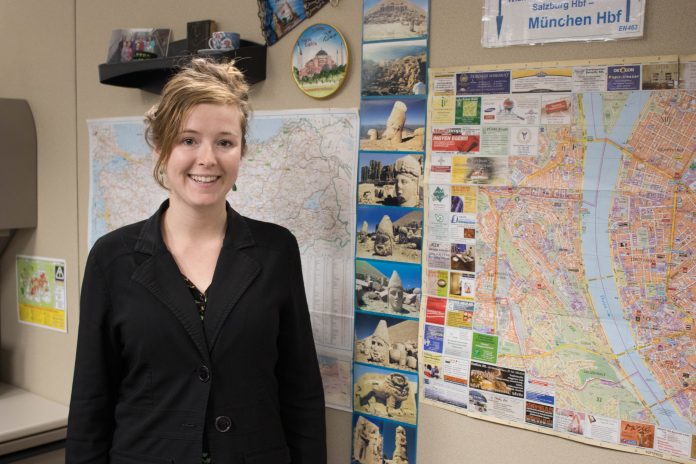
Pete Loganbill
Features editor
ploganbi@jccc.edu
After an 11-year-long process, EAP instructor and former student Alla Sobolevsky received her U.S. citizenship last Thursday.
“It was a [feeling] of relief in many ways,” Sobolevsky said. “Now, you can actually travel and not be scared that you’re not going to be able to come back. You can vote. You can actually make your voice heard. It takes a lot of effort and years and determination to become a U.S. citizen, so in some ways you feel satisfied that all those years of hard work paid off eventually.”
Sobolevsky chose to come the United States from Russia because of the many opportunities available here.
“I truly believed that if I [worked] hard, my life [would] be much better,” Sobolevsky said. “In Russia, it doesn’t matter, because you can work yourself to death and life will stay the same. [The] United States gives you hope. [The] United States is a cool country, always has been and always is.”
The process of becoming a citizen of the States is long and difficult. While Sobolevsky was able to come here by way of a student visa and then married an American citizen, she made it clear there is no simple way to do it.
“You can’t just apply for citizenship in [the] United States,” Sobolevsky said. “There is no such thing. There are so [many] multiple steps in between being a citizen and [an] immigrant in the United States.”
Dessa Crum, International and Immigrant Student coordinator, described four possible ways someone could gain citizenship.
“Maybe if you have family here, and you come for family,” Crum said. “Or, if you’re a skilled worker, having somebody sponsor you to work. Or, the refugee [route], or if you happen to come here and then become an asylee. The fourth one, the diversity program, if you happen to win the lottery.”
When someone gets into the States, they then need to get a temporary green card. After having it for two years, then are then able to apply for a permanent green card, and then citizenship. The process usually takes three to five years.
As opposed to large universities, the college provides a small community in which instructors can spend quality time with their students and guide them through the educational part of the process.
“We’re a fairly small office, and we really like to work with the students,” Crum said. “Sometimes, for our students it might a struggle sometimes when they go from JCCC or a smaller college and then go to a bigger university. I feel like we’re able to meet with them more one on one.”
Professor of business administration Samira Hussein came to the United States from Pakistan when she was 18 years old. Like Sobolevsky, she came here with a student visa. She had already received her undergraduate degree in Psychology in Pakistan, but ended up having to switch to Business when she came to the States.
After receiving a practical training visa, she applied for a teaching position everywhere she could.
“I found a private, four-year college,” Hussein said. “I kept waiting.”
Back in Pakistan, her parents kept calling the U.S. Embassy to try and schedule her interview to receive a green card, but to no avail.
“Finally, one day I called my lawyer and said, ‘why don’t you call?’,” Hussein said. “I guess they heard his American accent so they said, ‘her interview is in three days.’”
Hussein then stayed in the United States as a green card holder for about six years. Although she felt conflicted about giving up her Pakistani citizenship, she applied for U.S. citizenship after deciding it would make her life easier.
“Immigrants change America, and America changes immigrants,” Hussein said. “In my mind, I carry two passports: my American passport and my global passport.”
Throughout her journey, she has been very grateful for what she learned from her parents.
“[They] both believed in hard work, that you had to pay your debts to society, but not let any boundaries stop you,” Hussein said. “When I hear anti-immigrant rhetoric, it’s very hurtful. Nothing was ever handed to you.”





















